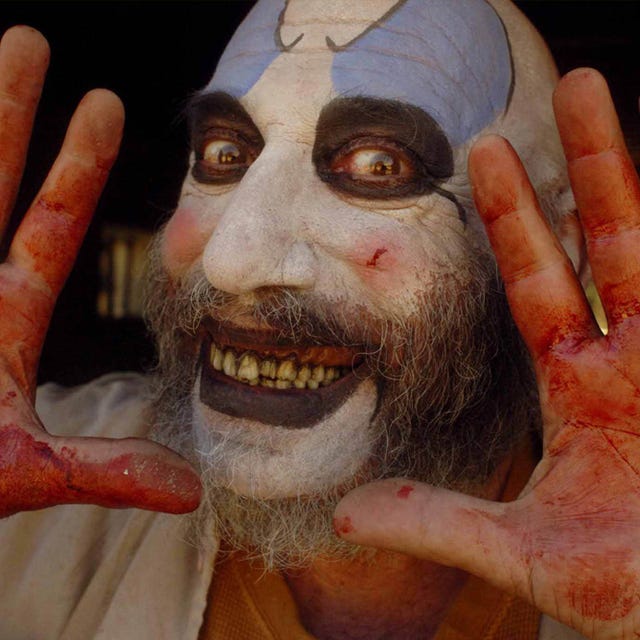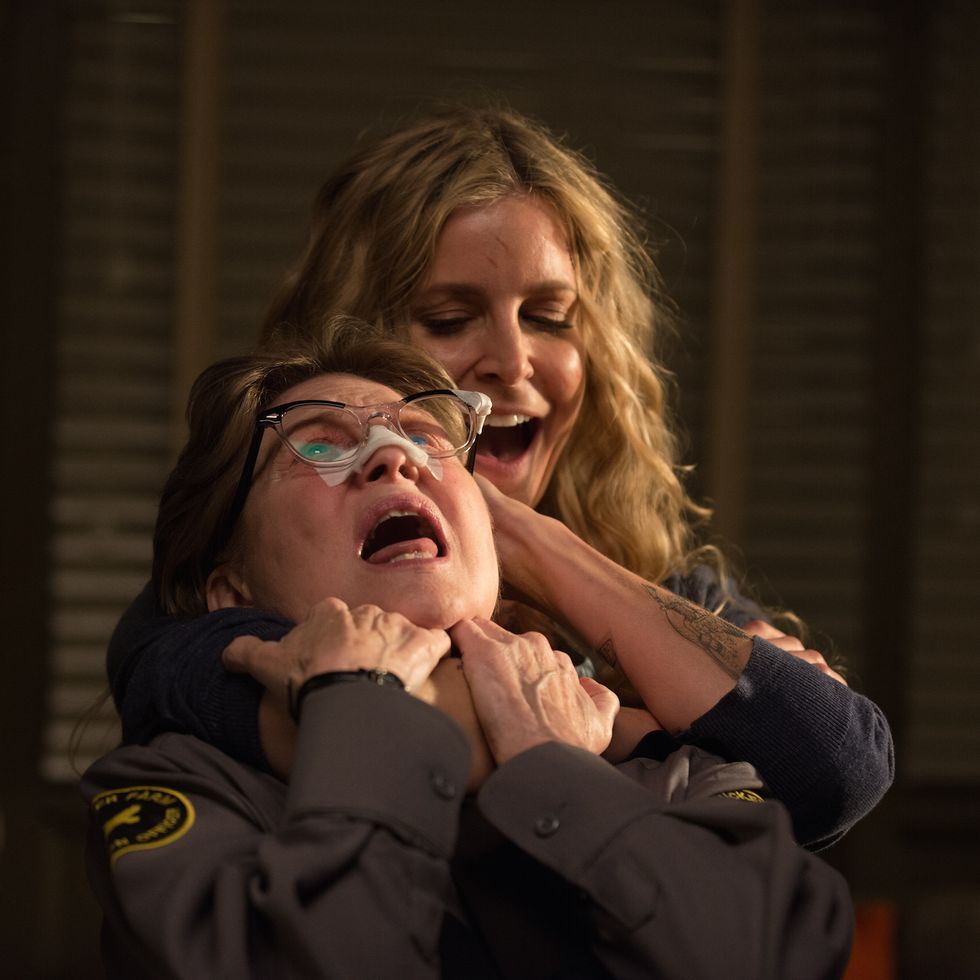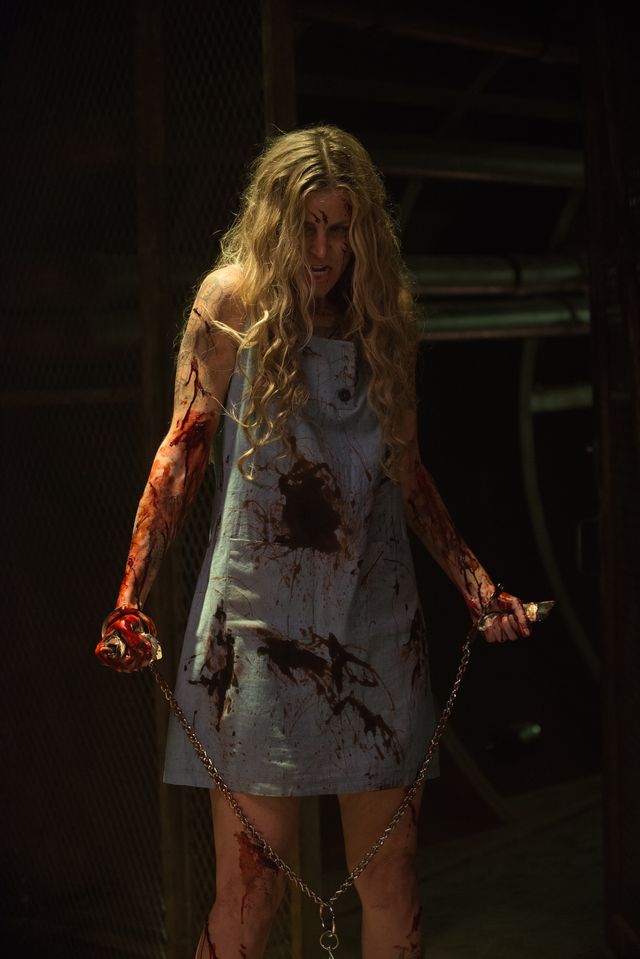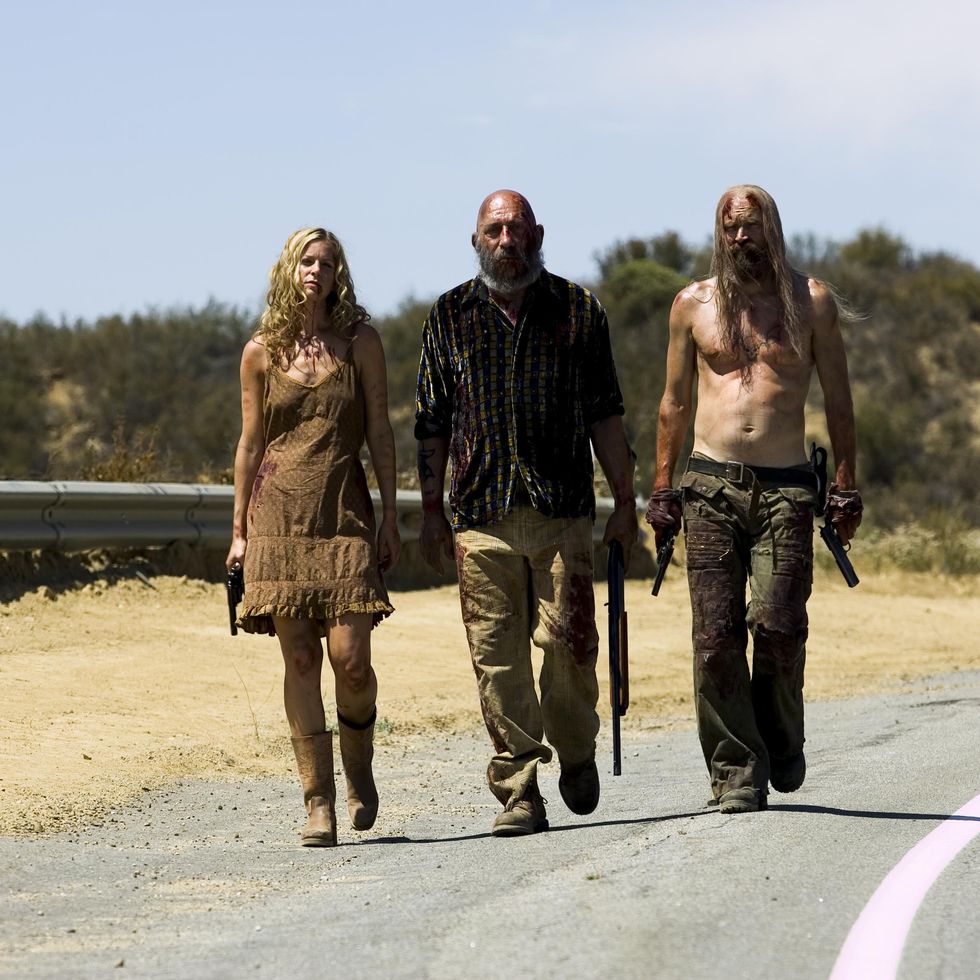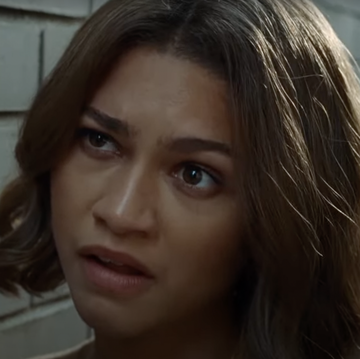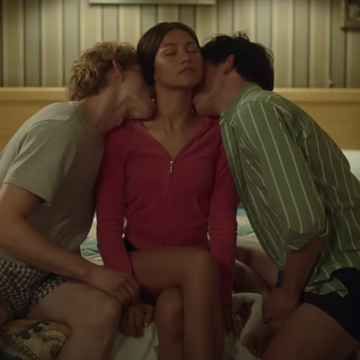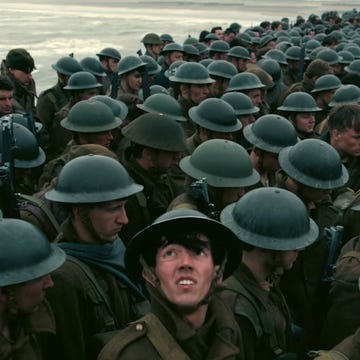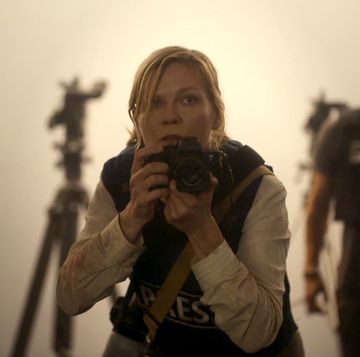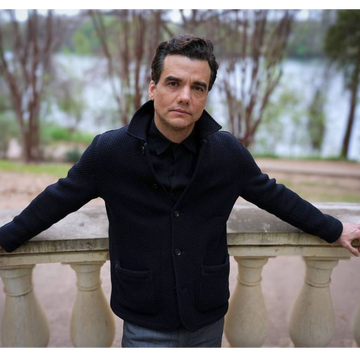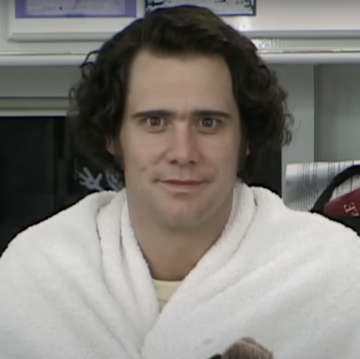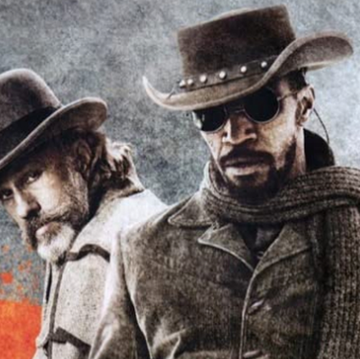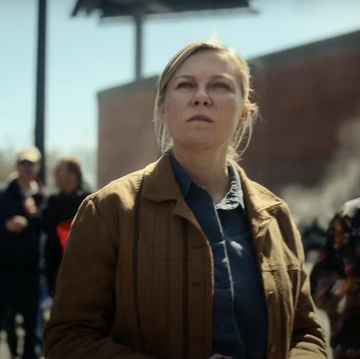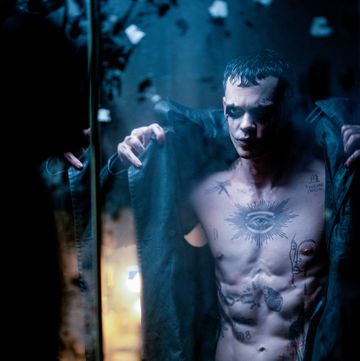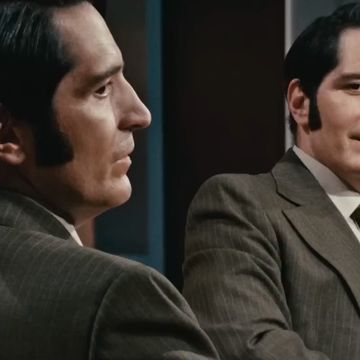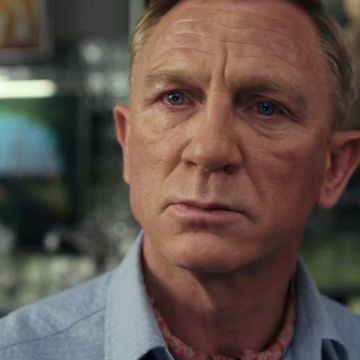Rob Zombie’s cinematic world is one of corruption. Whether in suburban communities or backwater enclaves accessible only by dusty dirt roads, evil is everywhere, and contact with it only spawns more of the same. It’s a brutal place of suffering and madness, which spreads like a virus until everyone and anyone is infected. Loud, crude, and in your face, Zombie’s movies are about the terrifying power of wickedness. And by reveling in the perversity of society’s underbelly, they dispense a potent strain of grungy amorality.
In an increasingly sanitized multiplex landscape consumed with family friendly franchising, Zombie’s stellar output is a knowing throwback to the grindhouse exploitation fare of the ‘60s and ‘70s, and thus functions as an unrepentant act of defiance. He’s the choleric fly in the mainstream-movie ointment, and it’s no surprise, then, that he’s succeeded in rubbing many viewers the wrong way. Look him up on Rotten Tomatoes, and you’ll find the negative far outweighing the positive; his highest-rated effort, The Devil’s Rejects, stands at an unimpressive 56 percent. Even in a genre founded on extremeness, Zombie—a heavy metal icon whose entire professional life is a veritable tribute to horror—wallows in real-deal foulness. In doing so, he’s made himself something of an outlier.
To be sure, Zombie’s decision to reimagine John Carpenter’s hallowed Halloween wasn’t the safest way to win over the slasher faithful. Yet his lack of widespread cinematic acceptance seems to stem less from that single decision than from a more general distaste for the macabre ugliness he peddles. Though he’s certainly capable of orchestrating well-manicured scares, Zombie’s horror isn’t of the polished Jordan Peele/Ari Aster variety. On the contrary, his lurks in the fetid swamps, the dingy alleys, the rotting graveyards, and the blasphemous Inferno, and it comes equipped with raggedy aesthetics to match its demon-bikers-from-Hell insolence. An old-school boundary-pusher working in a status-quo environment averse to the truly transgressive, he gets little of the credit he deserves because he takes horror to the profane outer-limit places it’s supposed to go—but, these days, so infrequently does.
Zombie recognizes that there’s no fear without confrontation, and his films are unpleasant smacks up side the head that aim to draw blood. There’s definitely plenty of crimson to be found in his latest, 3 From Hell (in theaters Sept. 16), the third chapter of a series he began with 2003’s House of 1000 Corpses and resumed with 2005’s The Devil’s Rejects. Diligently following the template set by the latter, Zombie’s newest offering is another sizzling scuzzbucket special, resurrecting the Firefly Clan–psycho Otis (Bill Moseley), sexpot Baby (Sheri Moon Zombie), and clownish Captain Spaulding (Sid Haig)—in order to let them indulge in more monstrous mayhem, this time aided by brother-in-law Foxy (31 alum Richard Brake).
Come for the grease-painted gore, stay for the grisly humor—and warped point of view.
It’s a return engagement craved by many, considering that The Devil’s Rejects remains Zombie’s crowning achievement. A sinister dose of southern-fried nastiness, that 2005 film has a mean streak a mile wide, exemplified by a motel-room torture session that dares you to look away. Moreover, it has the gall to make you root for its villains, whose reign of terror is opposed by a lawman, sheriff Wydell (William Forsythe), so consumed with vengeful hate that he succumbs to his darkest impulses. Even more than the Firefly family or his version of Michael Myers (in his two Halloween films), it’s Wydell—an individual transformed, through his encounters with sadistic fiends, into the obscene thing he opposes—that embodies the spirit of Zombie’s work. By the end of his ordeal, Wydell winds up the nominal bad guy, while Otis, Baby, and Spaulding are lionized in a hail-of-gunfire last stand set to Lynyrd Skynyrd’s anthem of outlaw independence, “Freebird.”
That approach is repeated by 3 From Hell, whose attitude continues to be celebratory and whose aesthetics are dominated by volatile handheld camerawork, sun-bleached hues, slow-motion, freeze frames (often instigating transitional wipes), and grainy home movie footage. Given that his prior 31 also employs this affected style, it’s a mode in which Zombie is clearly most comfortable operating, even if 2007’s Halloween and 2013’s The Lords of Salem illustrate his expertise at studied Carpenter-esque widescreen malevolence. Those two films now feel akin to slow-burn closers on an album that’s largely fast and gnarly, and attest to his versatile formal gifts. Attacking his material in either controlled or helter-skelter fashion, the writer/director voraciously amalgamates influences and then spits them back out as something at once familiar and new, as evidenced by 3 From Hell’s finale, which comes across as a demented Satanic variation on The Wild Bunch.
Zombie’s recording career (first as the frontman for White Zombie, and now as a solo artist) has always been steeped—lyrically and sonically, replete with sampled movie and TV audio snippets—in horror and sci-fi. The matching visual aesthetic he established for his music videos, full of schizoid montages of pop-culture bric-a-brac, suggested an encyclopedic love of all things spookshow-y. That’s carried over to his films, which are populated by famous genre actors in amusingly grotesque roles (including Dee Wallace, Ken Foree, Geoffrey Lewis, Malcolm McDowell, Brad Dourif, and Danny Trejo) and littered with dialogue about, and references to, a wide range of cinematic forefathers. Werewolf Women of the SS, his faux-trailer contribution to Quentin Tarantino and Robert Rodriguez’s Grindhouse, is a riotous homage to Nazi-exploitation fare, headlined by Nicolas Cage. The Devil’s Rejects themselves, meanwhile, get their names from famous Groucho Marx characters, and in 3 From Hell, Humphrey Bogart, James Cagney, and Lon Chaney are all topics of conversation—shout-outs that help contextualize Zombie’s own tales, which are descendants of the outsider B-movies that set a blowtorch to classic Hollywood notions of decency.
Zombie’s first feature, House of 1000 Corpses, most assiduously followed in his music videos’ footsteps, and its unrelenting hysterical-carnival-ride tone turned out to be more wearisome than its Texas Chainsaw Massacre-riffing story about a quartet of young adults who accidentally find themselves taking refuge at the Firefly residence, to dreadful ends. Everything is as garish and strident as possible in the director’s shaky debut, including the performance of Zombie’s favorite leading lady, wife Sheri Moon Zombie, an actress whose seductress persona (frequently marked by baby-doll cooing and cackling) is often put to use in degenerate-vixen parts. Still, in a protracted House of 1000 Corpses crane-shot of an outdoor execution (of a young Walton Goggins, no less), Zombie seemed to learn that, when it comes to horror insanity, calm is often more effective than chaos. And despite its plentiful audio-visual embellishments, The Devil’s Rejects bears out that revelation, generating its greatest unease from set pieces that take their time with their appalling business.
So too does his initial Halloween re-do, which imagines a bullied-and-abused backstory for Michael Myers that casts him not as a mythic boogeyman but, instead, as the byproduct of corrosive victimization. Zombie’s first Myers saga affects a Carpenter-esque mood to disquieting (and rugged) effect. His sequel, the under-heralded Halloween II (2009), goes in the opposite direction, switching up just about everything that defined its predecessor—from aspect ratio and film stock to pace and atmosphere—to deliver a vicious doom-metal nightmare enhanced by dreamlike David Lynch-ian interludes of longing for family, home and peace. Not that tranquility is in the cards for anyone in Zombie’s films, except via death or—in the case of The Lords of Salem, a gem of unholy birth-violation-sacrifice sights—acquiescence to the universe’s blackest forces.
The image of a painted Jesus surrounded by sparkling lights reoccurs throughout Zombie’s oeuvre, including 3 From Hell, but divine salvation is woefully absent. In that regard, the filmmaker forwards a bleakness that puts most of his wannabe-downbeat genre brethren to shame. Far from being emptily nihilistic, Zombie’s stories accept that goodness exists, but that it’s often (okay, almost always) powerless in the face of fouler realities: that the weak are at the mercy of the strong; that justice doesn’t uniformly prevail; and that the living can’t escape death. On the one hand, those notions are treated with grim seriousness (see: every dead skin mask crafted by Moseley’s Otis). And yet Zombie also understands the sick joke of it all—be it the futility of life, or making movies in which viewers are asked to root for serial killers—and he sculpts his films accordingly. Take for example when he playfully segues, in 3 From Hell, from a color-coded triptych of close-ups of Otis, Baby, and Foxy to a shot of a three-legged dog ambling away across a dingy Mexican courtyard.
Admittedly, it’s sometimes difficult to laugh amidst so much meat and gristle, but that’s part and parcel of what makes Zombie’s canon so memorable. He’s the rare contemporary filmmaker to make horror movies that are legitimately ghastly, offensive, and immoral, both as a means of providing nerve-rattling shocks and, just as importantly, to point the finger back at his audience. What he delivers often plays on the surface like shock-rock cinema. At its finest, though, it cuts through the bone and wire to expose the rancidness of a world gone to seed and, scarier still, our own corrupt fascination with the homicidal monsters that populate it—and our big-screen fantasies.
